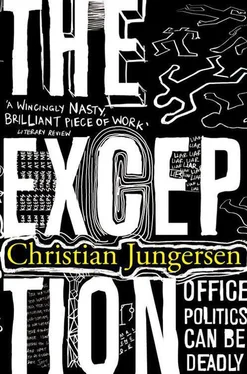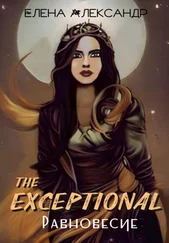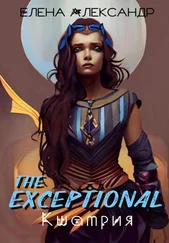Christian Jungersen - The Exception
Здесь есть возможность читать онлайн «Christian Jungersen - The Exception» весь текст электронной книги совершенно бесплатно (целиком полную версию без сокращений). В некоторых случаях можно слушать аудио, скачать через торрент в формате fb2 и присутствует краткое содержание. Год выпуска: 2010, Издательство: Orion Books, Жанр: Современная проза, Триллер, на английском языке. Описание произведения, (предисловие) а так же отзывы посетителей доступны на портале библиотеки ЛибКат.
- Название:The Exception
- Автор:
- Издательство:Orion Books
- Жанр:
- Год:2010
- ISBN:нет данных
- Рейтинг книги:3 / 5. Голосов: 1
-
Избранное:Добавить в избранное
- Отзывы:
-
Ваша оценка:
- 60
- 1
- 2
- 3
- 4
- 5
The Exception: краткое содержание, описание и аннотация
Предлагаем к чтению аннотацию, описание, краткое содержание или предисловие (зависит от того, что написал сам автор книги «The Exception»). Если вы не нашли необходимую информацию о книге — напишите в комментариях, мы постараемся отыскать её.
The Exception — читать онлайн бесплатно полную книгу (весь текст) целиком
Ниже представлен текст книги, разбитый по страницам. Система сохранения места последней прочитанной страницы, позволяет с удобством читать онлайн бесплатно книгу «The Exception», без необходимости каждый раз заново искать на чём Вы остановились. Поставьте закладку, и сможете в любой момент перейти на страницу, на которой закончили чтение.
Интервал:
Закладка:
‘Thanks.’
‘And they had loads of ideas about who might’ve emailed us. I borrowed a notepad from the bar and began a list. Here, look.’ The list already has more than twenty names.
Malene sits down. ‘I don’t know where to begin.’
‘Let’s move to an Internet café.’
Malene hasn’t finished her wine, but she understands that collecting information is Iben’s way of dealing with stress, so she drains her glass quickly.
While they’re getting ready to leave Malene’s mobile rings. It’s Lotta from the Swedish study programme on the Holocaust and Genocide.
‘Iben called me earlier. Her phone has been busy so I thought I’d try yours. I wanted you to know that I’ve phoned around. Nobody seems to have received any emails. That’s all, really. Except, everyone I spoke to came up with people who might have done it. Do you have pen and paper handy?’
Malene adds to Iben’s list. ‘Thanks. That’s great.’
‘You’re welcome. Take it as a thank you for your article. It was great.’
‘What? Which article?’
‘“A Guitarist from Banja Luka”. About Mirko Zigic. We had it translated and printed it in our weekly paper.’
‘But Iben wrote it.’
‘Did she? I thought it was you.’
‘No, I didn’t. She did.’ Iben must have left out her by-line in the Word version of the article. Then it hits her what the mistake means. ‘Christ!’
‘What’s the matter?’
Malene has to make sure. ‘Lotta, that article, is it on your website now in my name?’
‘I think so. I mean, what we publish in print instantly goes on to our website as well. Automatically. Not that I—’
Iben interrupts. ‘Tell me. What’s happened?’
Malene needs to sit down, but somewhere else, where they aren’t visible from the street. Holding the phone, she puts her arm around Iben.
‘Iben, I’m so very sorry. In Sweden your article about Zigic was put on the Internet under my name.’
Iben backs away. ‘I see. Now we know. It couldn’t be anyone else, could it?’
Malene doesn’t like the tone of her voice. ‘No.’
‘Mirko Zigic is the only one we’ve both written about.’
A Guitarist from Banja Luka
Old friends of Serb war criminal Mirko Zigic still cannot grasp that their schoolmate is wanted by the International War Crimes Tribunal at The Hague .
By Iben Højgaard
‘Mirko was a guitarist in the band and composed most of their music,’ says Ljiljana Peric, who was at secondary school in the same class as Mirko Zigic.
‘No question about it, he had something special. He believed he could make a living as a rock musician after leaving school. His band played a kind of intense, poetic guitar rock that only became the “in” thing a few years later. He was good, and we all wished him well, but no one really believed that he’d make it apart from the boys in his band and a handful of groupies.’
Ljiljana Peric is a political scientist from Serbia, who attended the Oslo conference, Strengthening Democratic Media in the Aftermath of War. Our hotel rooms were on the same floor and, chatting in the lift one afternoon, Peric touched on her early friendship with Mirko Zigic. Zigic has been charged with war crimes and is wanted by the International War Crimes Tribunal at The Hague.
We agreed to meet in the hotel bar that evening, and that I would bring my tape recorder.
The good years: until 1990
That evening, Peric began by describing the secondary school in Banja Luka, the town where she and Zigic grew up.
‘It was a large school, with more than a thousand pupils and was built in the 1970s. Mirko was good-looking, and had a mane of blond hair and a thin face that made him look like a rock star. He arranged gigs in cafés and bars, not only for his own band but for others too. He might have made it if the fashion for US grunge music had arrived a few years earlier and not when the war started.
‘I used to gossip about him with my girlfriends. Some of them were crazy about him. And I have such a clear image of Mirko putting up posters for concerts that he had arranged himself. He was so passionate about music, always insisting that everyone should subscribe to his favourite music and not waste time on dumbed-down pop.
‘We were a mixed school — Serbs, Muslims, Croats — but we never paid much attention to racial divisions. After the economic crisis of the eighties the future looked bright for young people. The Yugoslav economy was buoyant and the country politically independent of both the Eastern and Western blocs. Lots of people went shopping for clothes in Italy and travelled to places like Budapest for concerts or theatre. The recent communist past meant that tickets were much cheaper.
‘In 1990, one year after we had left school, there were occasional TV reports about small paramilitary groups stopping cars at roadblocks to check identity papers. It seemed to be happening only in the countryside, so we figured it must be gangs of peasant blockheads who had nothing better to do than play soldiers. Nobody I knew even imagined it might be a precursor to war.
‘But only a few months later, the war began. Suddenly, these stupid peasants morphed into real soldiers. The TV news was full of massacres, one after the other. The broadcasters would advise viewers several times a day to send children and old people out of the room because they were about to show Serb bodies that were decapitated or half-decomposed, floating down rivers — that sort of thing.’
The propaganda
‘These images made us very sad and angry, of course. We all shared a desperate wish to help, to do something.
‘This was Serb-controlled TV and just when the viewers were at their most upset and vulnerable, the screens would fill with war propaganda. We were told that Muslims and Croats were on the rampage, killing Serb civilians, reminding us that this was a repetition of what happened during World War Two when “they” murdered four hundred thousand of “us”. We watched this kind of thing day in and day out.
‘Naturally we discussed what was going on, but the Serb government had a tight grip on all information. Then, one day, a Muslim friend of mine said: “Ljiljana, listen to yourself. Do you realise what you’re saying? How do you know? Who says that this is what’s really going on?”
‘I had to admit that the propaganda had affected me. I, who had felt so sure of seeing through their lies! I decided to avoid the official spokesmen from that day on and stopped watching TV, listening to the radio, or reading the newspapers — but it’s hard to do when your country is at war.
‘Not everyone had friends who could help them hold on to the truth. Anyway, before long, our generation was scattered all over the world. People escaped to Britain, Scandinavia, Italy, the United States. Not just Muslims and Croats, but young male Serbs who wanted to avoid military service. Many of our young men were called up and others volunteered. The majority of us could not understand what went on in the heads of those who went willingly to war. Still, Mirko wasn’t the only one who did — far from it.’
It must be a mistake
‘The war went on and on. Tens of thousands died, neighbour turned against neighbour and old friends informed on each other, leading to imprisonment or execution. It was incomprehensible. We couldn’t trust the radio or the television, yet endless stories did the rounds.
‘We heard about Mirko by word of mouth. What was said about him was different … well, even worse. As a squad leader he had turned up with his men at the home of his Muslim second cousin and raped her. He killed her afterwards. And he’d cut the ears and the tongue off a young Serb soldier who had talked about deserting.
Читать дальшеИнтервал:
Закладка:
Похожие книги на «The Exception»
Представляем Вашему вниманию похожие книги на «The Exception» списком для выбора. Мы отобрали схожую по названию и смыслу литературу в надежде предоставить читателям больше вариантов отыскать новые, интересные, ещё непрочитанные произведения.
Обсуждение, отзывы о книге «The Exception» и просто собственные мнения читателей. Оставьте ваши комментарии, напишите, что Вы думаете о произведении, его смысле или главных героях. Укажите что конкретно понравилось, а что нет, и почему Вы так считаете.












